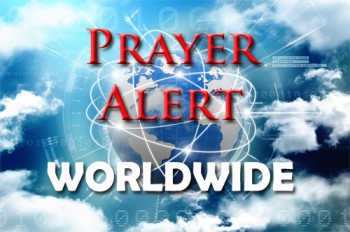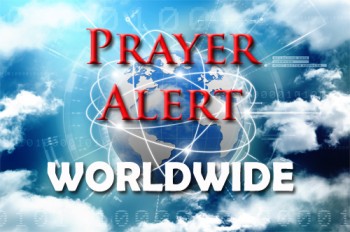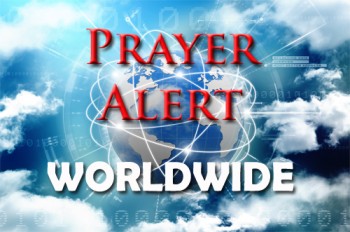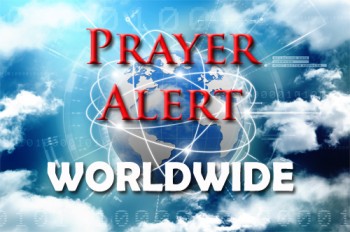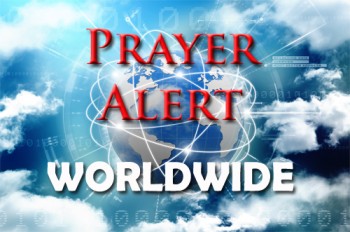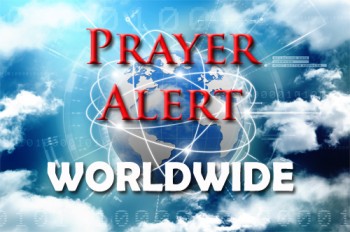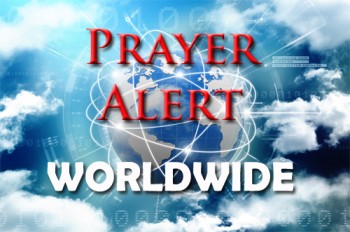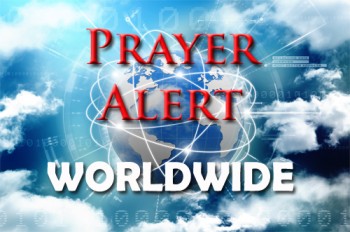Displaying items by tag: Africa
Ghana: children trapped on Lake Volta
Thousands of children work in Lake Volta’s massive fishing industry: many are slaves. Children as young as 4 are abused and malnourished. Their work is dangerous; drowning and other hazards are a constant threat. Victims rise before dawn to go out and dive down into the dark water to untangle fishing nets. IJM estimates that nearly two-thirds of children working on the Lake are trapped in slavery. Since 2015, 164 victims have been rescued from the lake’s fishing industry, and 31 suspected traffickers have been arrested. Today thousands of children are trapped there. Before the lockdown IJM were about to launch rescues. Pray that these children will be found and saved now that lockdown is lifted. Pray that IJM will be able to access communities and offer support where needed.
East Africa: triple tragedy
Torrential rains causing floods and landslides displaced 100,000 people and killed about 200 in Kenya. Floods destroyed 8,000 acres of crops, and the extreme rainfall will continue until the end of May. In Uganda, a river burst its banks, causing people to flee for safety. The waters of Lake Victoria have risen to unprecedented heights, forcing shoreline communities to abandon their homes. Rwanda, too, has seen houses, roads, and crops destroyed, and many killed by mudslides. At the same time, trillions of locusts have descended on the region. They can travel over 100 miles a day. There are 18 separate swarms in Kenya at present, and weather conditions are expected to favour breeding, so that a third generation could hatch in June and July. Added to these two tragedies, coronavirus is spreading among huge numbers of displaced people and closed borders are delaying delivery of pesticides to locust-affected areas.
Kenya: police abuse of power
In many places, police not only fail to protect people in poverty from violence, but they are violent predators themselves. Millions of the most vulnerable people in the world live in fear of police who extort bribes and brutalise innocent citizens. This has increased during coronavirus curfews. In Kenya it is easy for a corrupt or incompetent police officer to falsely accuse and imprison or even kill an innocent person. As measures have been put in place to prevent the spread of coronavirus, there has been a spike in police abuse while enforcing the night curfew. The government’s independent policing oversight authority has documented at least 35 cases of police brutality in connection to the curfew enforcement, including twelve deaths. Other agencies report at least one death a night in the communities which the justice centres monitor.
Persecution and other dangers amid coronavirus
During the coronavirus lockdown, Nigerian Fulani militants have murdered a five-year-old child they snatched from a pregnant mother, another nine Christians including two children, and a second pregnant woman In Egypt, seven Islamist terrorists, suspected of plotting to attack Christians under cover of the nightly coronavirus curfew, were shot dead. In West Africa, Boko Haram leader Abubakar Shekau declared coronavirus a ‘product of evil’ while he mocked health measures and stepped up attacks. In East Africa the arrival of a second invasion of ravenous young locusts, spawned in Ethiopia, is feared to be twenty times more severe than the plague that devastated crops in January. Iran is facing major challenges. Its slow response to the pandemic, lack of transparency, and absence of an exit strategy, together with the US sanctions and the fall of oil prices, have compromised its healthcare system, its economic situation, and the daily lives of its people.
Northern Uganda: a call for intercession
A missionary writes, ‘May we beg for your redoubled prayers as a “Double Whammy” threatens our communities. The Ugandan lockdown seems to be stemming Covid-19 and has just been extended for 21 days. Very tough on children; folk barely earning enough to eat; Sudanese refugees with 30% cut in rations and unable to plant more than a few vegetables; and the elderly with no one to help them. But many have spent lockdown in the fields, preparing to plant. Rains have begun and seeds are beginning to grow. This morning I rode my bicycle past fields of young beans and groundnuts. However, another threat hangs over us now. The locusts experienced in January have bred and millions of young are growing and devastating crops, trees, and cattle fodder. The military and everyone are concentrating on Covid-19. The locusts are spreading towards the huge refugee settlements and West Nile. Massive hunger could weaken the population, and we really wonder what might follow.’
Covid-19 Pandemic 1 million cases on 2 April
Global case counts of COVID-19 quietly clicked past 1 million 2nd April afternoon on the Johns Hopkins tracking map, revealing the disease’s startling speed and reach since it emerged 4 months ago.
The pandemic is afflicting countries unevenly as the US muffed its early response, while China acted with strong-armed efficiency, and many others are yet to be tested.
Global Highlights
The US: Though the novel coronavirus has emerged in all 50 states, the media focus has zeroed in on New York, which has more than 92,000 cases. That will likely change in the coming days as new hotspots emerge, according to Scientific American.
The American South is at special risk with high numbers of cases per capita. Albany, Georgia has 13 per 10,000 people, for example. And, as Bloomberg News points out, the region already has some of the poorest health indicators in the country (4 of 5 states with highest diabetes rates) and a lack of health care access that includes shuttered rural hospitals. Of the 239 coronavirus deaths in New Orleans, “40% had diabetes, 25% were obese and 21% had heart problems,” Bloomberg reports.
Africa: WHO has announced that new COVID-19 cases are being reported in Africa at a dramatically accelerating pace as the number topped this week, according to The Citizen (Tanzania). Another worrying sign: Cases are beginning to emerge outside capitals and other large cities. The coronavirus has been detected across South Africa, Burkina Faso, Cameroon, and Senegal.
Also: Very few of the more than 300 clinical trials that are underway to seek a COVID-19 treatment are in Africa, Nature reports. The Drugs for Neglected Diseases initiative is part of the new COVID-19 Clinical Research Coalition seeking to remedy this.
More:
South Africa: Though the country has the most cases (1,462) on the continent, President Cyril Ramaphosa and Health Minister Zweli Mkhize are being lauded for leading an effective and efficient battle against COVID-19, according to the BBC. However, the response also has included rounding up 1,000 homeless men and forcing them into a sports stadium in Pretoria, CNN International reports.
Ecuador: Officials in Guayaquil report more than 400 deaths in recent days as morgues have been overwhelmed and some bodies have been wrapped in plastic and left on street. UPI
Indonesia: The 170 COVID-19 deaths reported in recent weeks have surpassed nearly 2 decades of bird flu deaths. The Jakarta Post
North Korea: Assertions that the country is coronavirus-free has been viewed skeptically. The Guardian
Reporting from Johns Hopkins University: https://www.globalhealthnow.org/2020-04/1-million
Further data on Europe and the world: https://www.ecdc.europa.eu/en/geographical-distribution-2019-ncov-cases
BBC news article about the 18 countries who don’t have Covid-19 at the time of writing: https://www.bbc.co.uk/news/world-52120439
Pray: Lord God, the One who has Almighty power, we agree according to your promise in Matthew 18:18-20 that this virus will be stopped in its tracks. That the medical researchers will get a download from Heaven on how to quickly develop a vaccine to counteract COVID-19 and a cure for those who have become infected.
We also agree in prayer, asking that the Body of Christ worldwide will rise up in love and boldness, trusting in your blood to cover and protect us and throwing off fear, so that we can be available to serve, bless, and bear witness to those around us who are terrified and depressed at being infected.
Let us seize this unprecedented opportunity to make you known to those without hope in Christ!
Thank you for your promise that surely, you will be with us "always, even to the very end of the age” so that we can carry on with the mission you have given us for our world (Matthew 28:20).
Join in Online Prayers:
Praying for Unreached People Groups (UPGs) wholistically and in light of Covid-19 - Since 2018, The Extraordinary Prayer Task Force has focused on increasing prayer for UPGs through collaboration amongst leaders of church movements, mission movements & prayer movements. We meet on Zoom every two months, with our next global call April 20th from 9-11am US Central daylight time focused on praying wholistically for UPGs from the perspective of discipling nations. We will pray in light of Covid-19 outbreak, and also considering major spheres including healthcare, government, education, media and family as we pray for specific UPGs. If you're a leader of a prayer network and interested in joining the discussion, please contact David Sengupta (This email address is being protected from spambots. You need JavaScript enabled to view it.) for more information on how to connect to the April 20th call. Mention IPC.
Additional Prayer Resources for Coronavirus
A CHRISTIAN PERSPECTIVE ON COVID-19 By Dr Ruth Valerio and Gideon Heugh (Tear Fund)
A coronavirus prayer from Pete Greig
19 Things to Do in response to Coronavirus
Prophecy Today UK’s Responses to Coronavirus
PrayerCast Video and Prayer Briefing
Operation World's Covid-19 Prayers for the Nations and Prayer Calendar
Zimbabwe: ‘we will die of hunger in lockdown’
Coronavirus could not have come at a worse time for millions of Zimbabweans struggling with a deepening economic crisis, soaring food prices, stagnant salaries, water shortages and daily power blackouts. Early on 29 March Stewart Dzivira, his wife and their two-year-old son left Glen View to travel into Harare. For days now he has been unsuccessful in trying to get maize meal, a staple that has been in short supply following devastating droughts two years ago. He was not alone: hundreds of others were queueing on the eve of the three-week lockdown to contain coronavirus. Frequent thorough hand-washing with soap and water is the basic weapon against coronavirus, but in Harare alone one million people are without running water. Electricity is also scarce. Stewart said that without food ‘we’ll die of hunger.’
East Africa: coronavirus in locust-infested regions
By 2 April, there were 5,999 recorded coronavirus cases in Africa. 374 were in East Africa, a region already severely impacted by a plague of locusts and a food security crisis. WHO warned that Africa must ‘wake up’ and ‘prepare for the worst’ against the coronavirus pandemic. The UN has warned of an impending food crisis in East Africa, and concern is growing for Christians in affected regions, many of whom already face marginalisation and persecution for their faith. Pray for all people in East Africa as they are doubly tested by the coronavirus outbreak and the terrible locust swarms. Ask God to meet their needs and may they be comforted in the knowledge of God’s love for them. South Sudan is currently virus-free; may it remain so.
Nigeria: displaced Christians refused aid
Among two million people who fled Islamic extremist violence in northern Nigeria are hundreds being denied help because they are Christians. Displaced Muslims receive government-built homes, land, and financial support for resettlement, but 347 Christians are denied help because of their faith. ‘We cannot watch them die because they are unwilling to turn to Islam for support. We want to start something, no matter how small’, said a Christian leader of a small organisation (name withheld for security reasons). He wants to free land on the organisation’s properties to build homes for Christian converts denied entry into camps for the displaced. Many are left to die on their own, as no food or shelter is made available to them. The leader said, ‘We had tried within our little resources to help these ones, but the rejected people without external help to survive are too many.’ The organisation is now seeking support and funding.
Burkina Faso: jihadis, vigilantes, demoralised troops, crisis
Violent extremists have spread across Burkina Faso. Traditional hunters and crime-fighting vigilantes have filled a governance vacuum and add a complexity to the crisis. A new group provides locals with weapons and two weeks’ training to combat jihadists. Many worry it will make matters worse. National troops are implicated in countless rights abuses, while French counter-terrorism forces have little impact. A jihadist attack on a church recently left 24+ people dead in a crisis that has displaced over 750,000 people since the beginning of last year. This insecurity has left displaced people in rural areas outside the reach of aid groups - and a lack of clear information on which militants are operating where - has made it difficult for humanitarians to negotiate access to affected people. Most attacks are attributed to groups linked to al-Qaeda and IS, with a patchwork of self-defence gangs and poorly equipped soldiers also being responsible for abuses.
